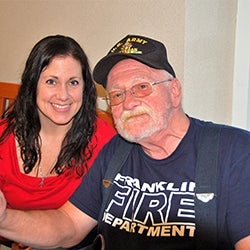
“I was worried I wasn’t going to see my granddaughter graduate from high school next year. The TAVR procedure saved my life.”
-Anthony Winkler, heart patient.
A year ago, Anthony Winkler’s health took a serious turn for the worse and he didn’t know why.
“I was really starting to sweat it because I was going downhill so fast.”
Winkler, 72 years old and from Franklin, NY, was used to leading a pretty active lifestyle caring for the family’s home, walking and pursuing his photography.
“I do digital photography, but it got to the point where I was very fatigued, and I couldn’t walk to the woods or even the mailbox without being out of breath. My memory started to fail. It was just a terrible downhill spiral.”
Then Winkler suffered congestive heart failure last fall, followed by a heart attack. He was diagnosed with pulmonary hypertension and aortic stenosis, a narrowing of the heart’s aortic valve that restricts blood flow. He wasn’t a candidate for open heart surgery because of his pulmonary hypertension. Dr. Dhananjai Menzies, director of Bassett’s cardiac catheterization lab and interventional program, suggested Winkler could benefit from a minimally invasive procedure known as transcatheter aortic valve replacements (TAVR).
"We replace aortic valves through a catheter that is advanced from the groin to the heart without the need for open heart surgery,” explains Dr. Menzies.
When it first became available about a decade ago, TAVR was available only to patients for whom traditional open-heart surgery was high risk or unavailable. "The procedure has exponentially grown, has been studied in patients with severe symptomatic aortic stenosis and has been found to be superior to surgical aortic valve replacement in the vast majority of patients [regardless of risk category],” notes Menzies.
Winkler spent just one day in the hospital following the TAVR procedure and says the improvement in his breathing and strength was noticeable almost immediately.
“It was amazing. I’m so thankful to the doctors at Bassett. I was worried I wasn’t going to see my granddaughter graduate from high school next year. They saved my life.”
Winkler hasn’t been able to return to everything he would love to do because of a bad hip and cataracts, but he has appointments with specialists at Bassett and is hopeful they’ll be able to fix those problems too.
